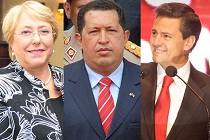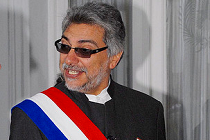‘No hope for a regime change’
R. Viswanathan, Distinguished Fellow, Latin America Studies, Gateway House, has been following the movements in Ukraine and Venezuela closely. In this interview, he explains the parallels and the impact on Venezuela
R. Viswanathan, Distinguished Fellow, Latin America Studies, Gateway House, has been following the movements in Ukraine and Venezuela closely. In this interview, he explains the parallels and the impact on Venezuela
 Courtesy: Wikimedia Commons
Courtesy: Wikimedia Commons
The death of Venezuelan President Hugo Chavez, election of President Michelle Bachelet in Chile, reforms in Mexico and the legalisation of cannabis in Uruguay have implications for the Latin American region. Gateway House examines how these will shape the region’s politics and economy in the coming years
 Courtesy: WikimediaCommons
Courtesy: WikimediaCommons
The return of the Left after four years, with the election this week of Michelle Bachelet as the president of Chile, will not mean any drastic change of direction. Chile has the most stable democracy and dynamic market in Latin America, and its Left can become a model for other countries, including India

Ambassador Viswanathan, an expert on Latin America, blogs about the Venezuelan elections, which saw a high turnout, free and fair elections, and Hugo Chavez re-elected as President. It is evident though, that Chavez’s model has reached its peak and is steadily and irreversibly losing appeal in the region.
 Courtesy: Merco Press
Courtesy: Merco Press
Merco Press republished Ambassador R. Vishwanathan's article on the impeachment of the Paraguayan President, Fernando Lugo. He argues that although the incident is a setback to the young democracy of the country, it shouldn’t be viewed as a repeat of Latin America’s history of coup d’états.
 Courtesy: Juan Alberto Pérez/Flickr
Courtesy: Juan Alberto Pérez/Flickr
While the ouster of Paraguay’s president is a setback to the young democracy of the country, it shouldn’t be viewed as a repeat of Latin America’s history of coup d’états. The painful process of democratic maturity will continue, albeit slowly.